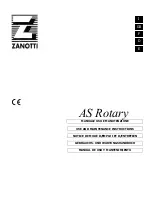
RLC-SVX19G-GB
97
11
UNT-PRC002-GB
Sound power levels
Discharge
Measurement conditions:
Measurements taken in a room adjacent to the room containing the FWD, at the outlet of the rectangular duct (1.5 m
long) fixed to its discharge opening.
Fan
Power level in dB(A), per Hz frequency band
Overall power
Unit
speed
125
250
500
1000
2000
4000
8000
dB(A)
1
55
50
42
37
37
31
30
46
FWD 08
2
57
54
47
40
30
38
40
50
3
58
57
50
42
32
40
43
53
1
57
51
45
42
34
33
28
48
FWD 10
2
58
54
48
45
38
39
35
51
3
60
58
50
48
40
42
39
54
1
57
51
45
42
34
33
28
48
FWD 12
2
58
54
48
45
38
39
35
51
3
60
58
50
48
40
42
39
54
1
56
62
50
48
39
38
36
56
FWD 14
2
61
66
55
53
47
46
45
60
3
63
69
58
56
50
50
49
63
1
57
63
51
49
40
39
37
57
FWD 20
2
61
66
55
53
47
46
45
60
3
63
69
58
56
50
50
49
63
Intake
Measurement conditions:
Measurements taken at the horizontal air intake.
Fan
Power level in dB(A), per Hz frequency band
Overall power
Unit
speed
125
250
500
1000
2000
4000
8000
dB(A)
1
56
55
55
53
46
45
42
57
FWD 08
2
63
62
60
60
53
53
53
64
3
66
65
63
62
56
55
57
67
1
62
58
55
58
51
48
44
61
FWD 10
2
66
63
60
62
56
55
52
66
3
70
67
63
65
59
59
57
69
1
62
58
55
58
51
48
44
61
FWD 12
2
66
63
60
62
56
55
52
66
3
70
67
63
65
59
59
57
69
1
66
65
65
65
57
50
46
68
FWD 14
2
73
72
69
71
64
59
57
74
3
78
76
73
75
69
64
63
78
1
68
72
64
64
56
52
50
69
FWD 20
2
76
76
68
71
65
61
61
75
3
78
79
71
74
69
66
66
78
Installation Requirements
Installation Responsibilities
Generally contractor must do the following items when
installing an RTAF unit:
1. Install the unit on a flat foundation strong enough to
support unit loading and level (within 5 mm across
the length and width of the unit).
2. Install the units as per instructions contained in this
manual.
3. Where specified, provide and install valves in
the water piping upstream and downstream of
the evaporator water connections, to isolate the
evaporator for maintenance, and to balance and trim
the system.
4. Furnish and install a water flow prove device and/or
auxiliary contacts to prove chiller water flow.
5. Furnish and install water pressure gauges in the inlet
and outlet of the evaporator water box.
6. Supply and install an air vent cock to the top of the
evaporator water box.
7. Furnish and install strainers ahead of all pumps and
automatic modulating valves.
8. Provide and install field wiring according to
schematics provided in the control panel.
9. Install heat tape and insulate the chilled water lines
and any other portion of the system, as required, to
prevent sweating under normal operating conditions
or freezing during low ambient temperature
conditions.
10. Ensure that the compressor and oil separator
heaters have been operating for a minimum of
24 hours before starting. Failure to do so may
result in equipment damage.
11. Start the unit under supervision of a qualified service
technician.
Nameplates
The RTAF outdoor unit nameplates are applied to the
exterior of the control panel. A compressor nameplate is
located on each compressor.
Unit Nameplate
The unit nameplate provides the following information:
•
Unit model and size description
•
Unit serial number
•
Identifies unit electrical requirements
•
Lists correct operating charges of R-134a and
refrigerant oil
•
Lists unit test pressures
Compressor Nameplate
The compressor nameplate provides following
information:
•
Compressor model number.
•
Compressor serial number.
•
Compressor electrical characteristics.
•
Utilization range
•
Recommended refrigerant
Storage
Extended storage of the unit prior to the installation
requires the following precautions:
1. Store the unit in a secured area, to avoid intentional
damages.
2. Close the suction, discharge and liquid-line isolation
valves.
3. At least every three months, connect a gauge and
manually check the pressure in the refrigerant circuit.
If the refrigerant pressure is below 13 Bar at 20°C (or
10 Bar at 10°C), call a qualified service organization
and the appropriate Trane sales office.
Note:
if the unit is stored before servicing near a
construction site it is highly recommended to protect
micro channel coils from any concrete and iron element.
Failure to do so may considerably reduce reliablity of
the unit.
Lifting and Moving Instructions
A specific lifting method is recommended, which can be
described as follow:
1. Lifting points are built into the unit, see lifting
instruction label on the unit.
2. Slings and spreader bar must be provided by crane
operator and attached on the lifting points.
3. Use the 4 or 8 rigging points (according to unit size)
which are built into the unit.
4. The minimum lifting capacity of each sling as well as
the spreader bar must be higher than the tabulated
unit shipping weight.
5. CAUTION! Lift and handle with care. Avoid shocks
while handling.
















































